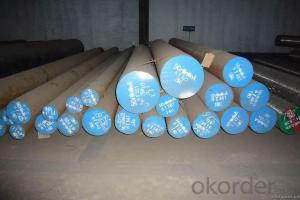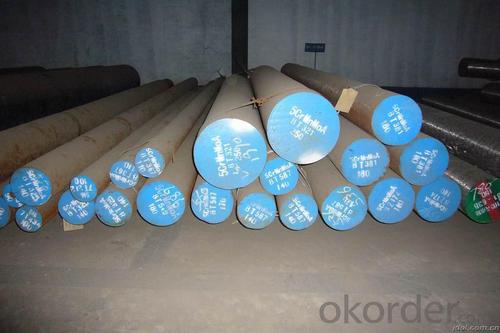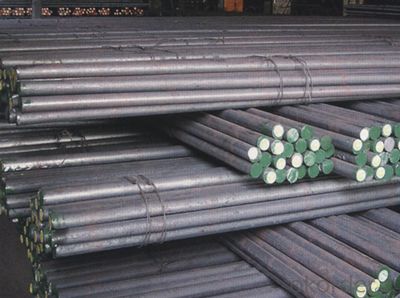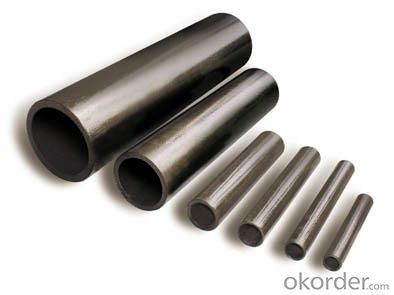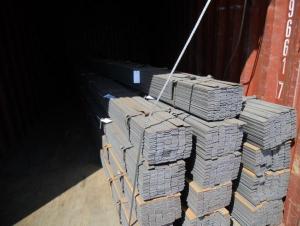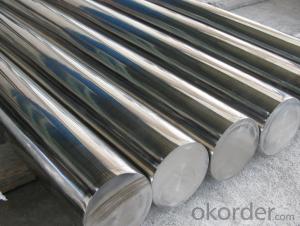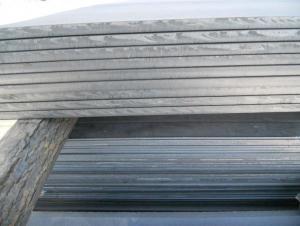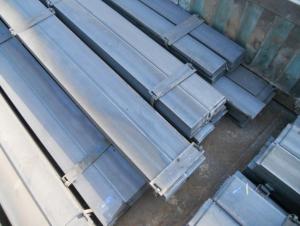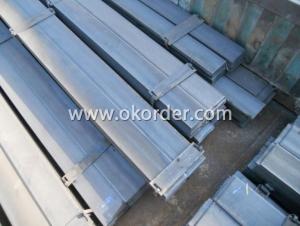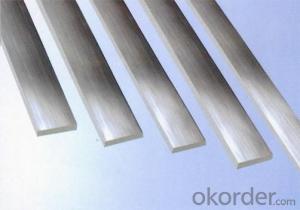Wide flat bar for construction made in China
- Loading Port:
- Tianjin
- Payment Terms:
- TT or LC
- Min Order Qty:
- 10000 m.t.
- Supply Capability:
- 10000 m.t./month
OKorder Service Pledge
OKorder Financial Service
You Might Also Like
Product Description:
OKorder is offering Wide flat bar for construction made in China at great prices with worldwide shipping. Our supplier is a world-class manufacturer of steel, with our products utilized the world over. OKorder annually supplies products to European, North American and Asian markets. We provide quotations within 24 hours of receiving an inquiry and guarantee competitive prices.
Product Applications:
Wide flat bar for construction made in China are ideal for structural applications and are widely used in the construction of buildings and bridges, and the manufacturing, petrochemical, and transportation industries.
Product Advantages:
OKorder's Wide flat bar for construction made in China are durable, strong, and resist corrosion.
Main Product Features:
· Premium quality
· Prompt delivery & seaworthy packing (30 days after receiving deposit)
· Corrosion resistance
· Can be recycled and reused
· Mill test certification
· Professional Service
· Competitive pricing
Product Specifications:
Specifications of Bearing Steel Round Bar
Grade | AISI 52100, ASTM E52100, DIN 1.3505,JIS SUJ2, GCr15 |
Dimensions | Diameter: 30-60mm Length: 2000-13000mm or as required |
Shape | Round Bar |
Type | Alloy Steel Bar |
Delivery Condition | Black Surface |
Material | Bearing Steel |
Technique | Hot Rolled |
Usage and Applications of Bearing Steel Round Bar
Bearing steels are used for ball and roller bearing applications and are comprised of low carbon steels and high carbon through harden able steel.
First the famous 1C-1.5Cr steel from which the majority of bearings are made. Its structure is apparently well-understood and the focus is on purity in order to avoid inclusions which initiate fatigue during rolling contact. Then there is the M50 steel and its variants, from which bearings which serve at slightly higher temperatures in aeroengines are manufactured, based on secondary-hardened martensite.
Tapered roller bearing are generally used to support combined load mainly consisting of radial load. Their cups are separable for easy assembling ,During mounting and using, radial clearance and axial clearance can be adjusted and preloaded mounting can be made.
Packaging & Delivery of Bearing Steel Round Bar
Packaging Detail: ASTM 52100 Steel in seaworthy packing or on customer request; Packed in bundles with standard export sea-worthy package or as customer require
Delivery Detail: 45 days after confirmed
Trade terms: FOB, CFR, CIF ou as customer's required
MOQ: 25 tons or at customer's demands. If the quantity is good, the price will be better.
Processing of Bearing Steel Round Bar
The processing of Bearing Steel Round Bar is hot rolled (strictly control sulphur, phosphorus and non-metallic inclusions content and distribution)
Chemical Composition of Bearing Steel Round Bar
C | Si | Mn | Cr | Ni | Cu |
Equal or less than | |||||
0.95-1.05 | 0.15-0.35 | 0.25-0.45 | Cr:1.40-1.65 | 0.30 | 0.25 |
All products' chemical composition and specification can be design according to customers' requirement.
Note of Bearing Steel Round Bar
1. According to national standard (GB) for our products, if not, supply according to national standards (GB) or agreement.
2. We can not only provide electric furnace +LF+VD and electros lag re-melting (ESR) steel forging materials, but also forging products of piece, bar, etc.
3. Our company is equipped with roll equipment and can provide our customers with roll billets or finished.
4. Please send us your detailed specifications when inquire. We will reply to you ASAP.
5. Certificate of quality is issued in English, in addition the normal terms, production process, the mechanical property (yield strength, tensile strength, elongation and hardness. forged ratio, UT test result, Grain size, heat treatment methods and the sample of is shown on the certificate
FAQ:
Q1: How soon can we receive the product after purchase?
A1: Within three days of placing an order, we will begin production. The specific shipping date is dependent upon international and government factors, but is typically 7 to 10 workdays.
Q2: Can stainless steel rust?
A2: Stainless does not "rust" as you think of regular steel rusting with a red oxide on the surface that flakes off. If you see red rust it is probably due to some iron particles that have contaminated the surface of the stainless steel and it is these iron particles that are rusting. Look at the source of the rusting and see if you can remove it from the surface.
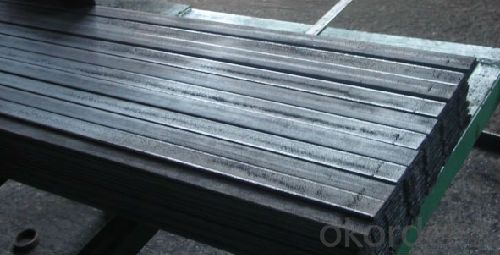
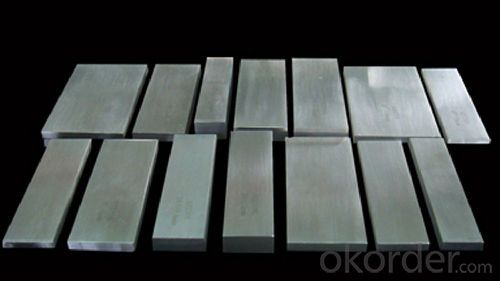
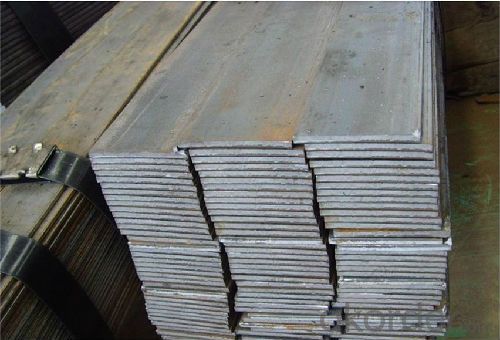
- Q: What are the properties of high-temperature tool steel?
- High-temperature tool steel possesses a combination of properties that make it suitable for use in high-temperature applications. It has excellent hardness, toughness, and wear resistance, enabling it to withstand extreme temperatures without losing its shape or strength. Additionally, it exhibits good thermal conductivity and dimensional stability, ensuring that it maintains its form and performance even under high heat and thermal cycling.
- Q: What are the factors that affect the fatigue strength of special steel?
- There are several factors that can affect the fatigue strength of special steel. These include the composition and microstructure of the steel, the presence of defects or impurities, the surface finish and treatment, the loading conditions and stress levels, and the temperature and environmental conditions in which the steel operates. Additionally, factors such as heat treatment, alloying elements, and manufacturing processes can also impact the fatigue strength of special steel.
- Q: What are the main corrosion resistance properties of special steel?
- The main corrosion resistance properties of special steel include high resistance to rust, oxidation, and chemical attack. It can withstand harsh environments, such as exposure to saltwater, acids, and alkalis, without significant degradation. Additionally, special steel often possesses a passive oxide layer on its surface, which acts as a protective barrier against corrosion.
- Q: What are the different surface finishing techniques for special steel parts?
- There are several surface finishing techniques that can be used for special steel parts to enhance their appearance, protect them from corrosion, and improve their overall performance. Some of the commonly used techniques include: 1. Polishing: This technique involves using abrasives to create a smooth and glossy surface on the steel part. It not only enhances the aesthetic appeal but also improves the part's resistance to corrosion. 2. Plating: Plating is a process that involves depositing a layer of metal onto the surface of the steel part. Common plating options include chrome, nickel, and zinc. This technique provides additional protection against corrosion, improves wear resistance, and can also give the part a desired color or finish. 3. Powder coating: Powder coating is a method where a dry powder is applied to the surface of the steel part electrostatically and then cured under heat. The powder melts and forms a hard, durable, and attractive coating. This technique provides excellent resistance to corrosion, impact, and chemicals. 4. Anodizing: Anodizing is primarily used for aluminum, but it can also be applied to some special steel parts. It involves creating a controlled oxide layer on the surface of the part, which enhances its corrosion resistance, improves its appearance, and can provide an insulation layer. 5. Passivation: Passivation is a chemical process that removes free iron and other contaminants from the surface of the steel part. It helps prevent corrosion and improves the part's resistance to staining or discoloration. 6. Heat treatment: Heat treatment is a process that involves heating and cooling the steel part to alter its physical and mechanical properties. It can improve hardness, strength, and toughness, while also providing a desired surface finish. 7. Electropolishing: Electropolishing is an electrochemical process that removes a thin layer of metal from the surface of the steel part. It helps eliminate surface imperfections, smoothens the part, and improves its corrosion resistance. It is important to choose the appropriate surface finishing technique based on the specific requirements of the special steel part, such as its function, desired appearance, and environmental conditions it will be exposed to.
- Q: What are the different methods of machining special steel?
- There are several different methods of machining special steel, each with its own advantages and applications. Some of the most common methods include: 1. Turning: Turning is a machining process that involves rotating a workpiece while a cutting tool removes material from the surface. This method is typically used to create cylindrical shapes and can produce high-quality finishes. 2. Milling: Milling is a versatile machining method that uses rotary cutters to remove material from a workpiece. It can be used to create complex shapes and contours, and is often employed in the production of special steel components. 3. Drilling: Drilling is a machining process that involves creating holes in a workpiece using a rotating cutting tool. It can be used to create both through holes and blind holes in special steel, and is commonly used in various industries. 4. Grinding: Grinding is a precision machining method that uses an abrasive wheel to remove material from a workpiece's surface. It is often used to achieve tight tolerances and smooth finishes on special steel components. 5. Broaching: Broaching is a machining process that uses a sharp cutting tool with multiple teeth to remove material in a series of linear cuts. It is commonly used to create keyways, splines, and other intricate shapes in special steel. 6. Electrical Discharge Machining (EDM): EDM is a non-traditional machining method that uses electrical discharges to remove material from a workpiece. It is particularly useful for machining special steel with complex shapes or for creating small features. 7. Laser Cutting: Laser cutting utilizes a high-powered laser to cut through special steel with extreme precision. It is commonly used for intricate designs and can produce smooth edges without the need for subsequent processing. Each of these methods has its own advantages and limitations, and the choice of machining method depends on factors such as the desired outcome, the complexity of the part, and the properties of the special steel being machined.
- Q: Can special steel be recycled?
- Yes, special steel can be recycled.
- Q: Can special steel be used in the production of bearings?
- Yes, special steel can be used in the production of bearings. Special steel alloys such as stainless steel or high-carbon chromium steel are often used to manufacture bearings due to their superior strength, durability, and corrosion resistance properties. These specialized steels ensure that bearings can withstand heavy loads, high temperatures, and harsh operating conditions, making them suitable for various industries, including automotive, aerospace, and manufacturing.
- Q: What are the different non-destructive evaluation techniques used for special steel?
- There are several non-destructive evaluation techniques used for special steel, including ultrasonic testing, magnetic particle inspection, liquid penetrant testing, eddy current testing, and radiographic testing. These techniques are used to detect flaws, defects, and structural integrity issues in special steel without causing any damage to the material.
- Q: How does the heat treatment process affect the properties of special steel?
- The properties of special steel are greatly affected by the heat treatment process. This process involves controlled heating and cooling of the steel to modify its microstructure and, as a result, its mechanical properties. To begin, heat treatment can increase the hardness of special steel. By heating the steel to a specific temperature and then rapidly cooling it through quenching, the steel undergoes a phase transformation that boosts its hardness. This is especially advantageous for applications that demand high strength and resistance to wear, such as cutting tools or bearings. Furthermore, heat treatment can enhance the toughness of special steel. By tempering the quenched steel at a lower temperature, the brittleness caused by rapid cooling can be minimized, leading to improved toughness and ability to withstand impacts. This is crucial in applications where the steel must endure sudden shocks or impacts, like in automotive or aerospace components. Moreover, heat treatment can also improve the overall strength of special steel. Through a combination of heating, cooling, and tempering processes, the steel's grain structure can be refined, resulting in increased strength and resistance to deformation. This is particularly critical for structural applications where the steel must withstand heavy loads or extreme conditions. Additionally, the heat treatment process can influence the corrosion resistance of special steel. By subjecting the steel to specific heat treatment cycles, the formation of certain phases or chemical compounds can be encouraged, leading to enhanced resistance against corrosion or oxidation. This is essential for applications exposed to harsh environments or corrosive substances, such as in marine or chemical industries. In conclusion, the heat treatment process is essential in modifying the properties of special steel. By carefully controlling the heating, cooling, and tempering cycles, the hardness, toughness, strength, and corrosion resistance of the steel can be significantly improved. This allows for the production of special steel with customized properties to meet the specific requirements of various industrial applications.
- Q: What are the different methods of protecting special steel against corrosion?
- There are several methods of protecting special steel against corrosion. These include applying protective coatings such as paints or epoxy, using sacrificial anodes or cathodic protection to redirect corrosion, employing corrosion inhibitors, and utilizing stainless steel or alloyed steel with higher corrosion resistance. Additionally, proper maintenance and regular inspections can help identify and address any potential corrosion issues early on.
Send your message to us
Wide flat bar for construction made in China
- Loading Port:
- Tianjin
- Payment Terms:
- TT or LC
- Min Order Qty:
- 10000 m.t.
- Supply Capability:
- 10000 m.t./month
OKorder Service Pledge
OKorder Financial Service
Similar products
Hot products
Hot Searches
Related keywords
